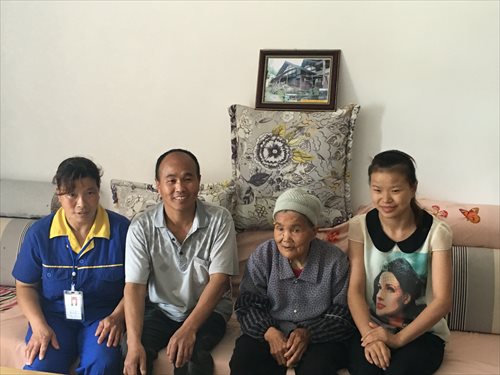
Xiong Shiguo (second from left) and his family sit in the living room of their new apartment. (Photo: GT/Zhang Yu)
To reduce poverty, China has started a massive plan to relocate 10 million people from their rural homes to nearby towns by 2020. In an effort to encourage them to move, local governments are providing free housing, job opportunities and integration programs, but some are reluctant to leave their homes.
Standing in his new home on the fifth floor of a recently-built apartment building in Southwest China's Guizhou Province, Xiong Shiguo, 47, looks at a framed photo hanging on the wall of his living room. It's a picture of his old home, a ramshackle wood and brick house standing by a muddy mountain road.
In March, local government officials relocated Xiong and his four family members from their impoverished hometown in mountainous north Guizhou, to his new home in a low-lying, urbanized district. The province hopes to move 1.3 million people like Xiong out of poverty by the end of the decade - the deadline for the Communist Party of China has set itself to achieve its goal of turning China into a "moderately well-off society."
What Guizhou is doing is part of an ambitious national plan, one of the biggest planned human migrations in history, to relocate 10 million farmers living in poor rural regions in 22 provinces to nearby towns by 2020. The central government is expected to spend 16 billion yuan ($2.39 billion) on relocation and building new homes this year.
Mass migration is nothing new to China. The country has seen multiple flows of migration since it was established in 1949. Some were spontaneous - such as the millions of migrant workers who have moved to China's coastal urban areas since the 1980s. Some were directed by the government, for example when young people were sent to rural areas to learn from farmers during the Cultural Revolution (1966-76). Officials have stressed that the ongoing relocation is completely voluntary - they promise no coercion will be used. But this also means it will be more difficult to carry out the project as many farmers have little motivation to leave the land where their families have lived for generations.
Xiong was one of the first in his village to move. His new home is in Bozhou, about 20 kilometers from his hometown. Previously called Zunyi county, Bozhou was designated a district this March in an effort to speed up urbanization, and it will become the new home to over 14,000 people from nearby villages. In Bailong neighborhood, 170 people from 15 villages have already moved in.
Living under the poverty line
For Xiong, that picture hanging in his living room is a reminder of his life as a farmer, which he officially gave up four months ago.
His old house was located halfway up a mountain, by a precipice. The scorching sun often burned his crops, which grew slowly in the tough farmland. Every morning, he had to get up before 4 am and walk for two hours on a mountain road to catch the morning market at a nearby town, where he sold his crops. The annual income of his family was a little above 5,000 yuan.
That made him one of 4.93 million people still living under the national poverty line in Guizhou, which is one of the country's poorest regions. For years, it ranked bottom among the 31 province-level regions in China's mainland by per capita GDP, according to the National Bureau of Statistics. In 2014, it finally moved up a rank and overtook Northwest China's Gansu Province.
Several tragedies that have occurred in Guizhou in recent years provide a glimpse of the grinding poverty of the region. Last year, four children, who had been fending for themselves as their impoverished parents worked far from home, killed themselves by drinking pesticides. In 2012, five children were found dead in a dumpster while trying to light a fire to keep themselves warm. Both incidents happened in Bijie, in northwest Guizhou.
Over 90 percent of Guizhou is mountainous. Life in the mountains is harsh, but local officials say they have had a hard time persuading villagers to move into towns despite the lure of better housing and subsidies. "In their rural homes, they feed on whatever they grow and rear, which is free of charge. In the city, they need to pay for everything from groceries to electricity. Many people don't want to move," Tian Lin, an official from Bozhou's supervision bureau, told the Global Times.


















































